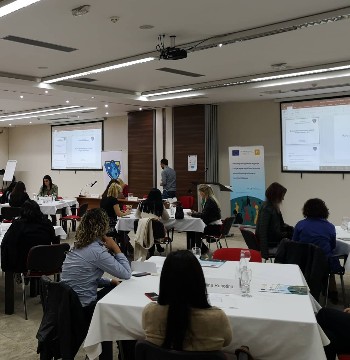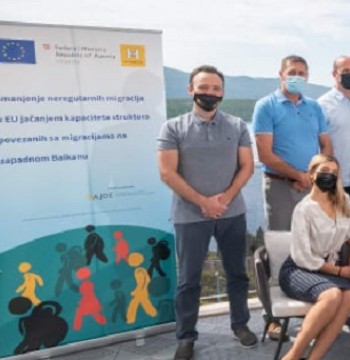Representatives of Western Balkan countries participate at the three-day regional conference "Gender Mainstreaming in Migration" in Sarajevo
Hilfswerk International, together with the Association for Help and Development "HAJDE", in cooperation with the Agency for Gender Equality of BiH, the Ministry of Human Rights and Refugees of BiH, and the MARRI Regional Center, is the host of a three-day conference "Gender Mainstreaming in Migration" in Hotel Holiday, Sarajevo, from the 13th to the 15th of October 2021, which brings together representatives of institutions, embassies, international organizations and civil society organizations from North Macedonia, Montenegro, Serbia, Albania, Kosovo, and Bosnia and Herzegovina. The event was organized as part of the project "Reducing Irregular Migration in the EU by Strengthening the Capacity of Migration-Related Structures in the Western Balkans".
Although gender issues are prevalent within migration, a significant number of prescribed policies and strategies do not attach enough importance to them in this context. In this regard, the gender aspects of migration are generally neglected or underestimated, which ultimately leads to negative, unforeseen consequences to the detriment of vulnerable and neglected categories in the migration process.
Samra Filipović-Hadžiabdić, the Director of the Agency for Gender Equality of BiH, warns of the non-recognition and invisibility of migrant women and the (non) definition of women in migration laws and theory, which has had a negative impact on their social rights. On this occasion, groups of women forced to travel alone or with children, pregnant women, nursing mothers, adolescents, as well as unaccompanied boys and girls and people with disabilities are often at particular risk of coercion, exploitation, trafficking, and other forms of violence.
Sashko Kocev, the Director of the MARRI Regional Center, emphasizes the importance of taking further steps and discussing gender-specific needs, as well that MARRI recognizes the importance of gender mainstreaming in practice and seeks to make efforts to ensure the application of a gender perspective in legal, strategic and operational documents relevant to migration. MARRI also has the authority to seek sustainable solutions that will improve migration management in the region, while ensuring the protection of migrants' human rights and addressing their needs.
Suzana Jašarević, the Regional Director for Balkans of Hilfswerk International, considers today's regional conference organized by Hilfswerk International in cooperation with the MARRI Regional Center, an opportunity to discuss gender mainstreaming in legal, political and institutional frameworks, as well as understanding the gender concept in the field of irregular migration. "Key actors from the Western Balkans will consider the role of gender mechanisms from a regional and EU perspective. In addition, in the coming period, we plan several regional events in cooperation with MARRI, on readmission, asylum, and other fields relevant to reducing irregular migration to the EU, with the participation of relevant representatives of institutions and agencies, both local and international," says Jašarević.
Representatives of individual countries who could not physically attend the conference participated online via the ZOOM platform. Until Friday, October 15th, participants have the opportunity to listen to expert presentations on topics related to: integration of gender perspective into legal, policy and institutional frameworks, why gender actually matters, the European perspective on gender, inclusion and intersectional gender-responsive approach to migration, as well as meanningful impacts of gender-responsive approaches on migration practice.
In this way, the common experience and practices of individual countries seek to influence important issues of gender mainstreaming in migration, which will reflect the positive impact on actions and processes, as well as improve the implementation of strategic documents on discrimination and gender rights.
The project "Reducing Irregular Migration in the EU by Strengthening the Capacity of Migration-Related Structures in the Western Balkans" is co-financed by the Asylum, Migration and Integration Fund (AMIF) and the Federal Ministry of the Interior of the Republic of Austria and implemented by Hilfswerk International in cooperation with the Association for Help and Development "HAJDE”.


